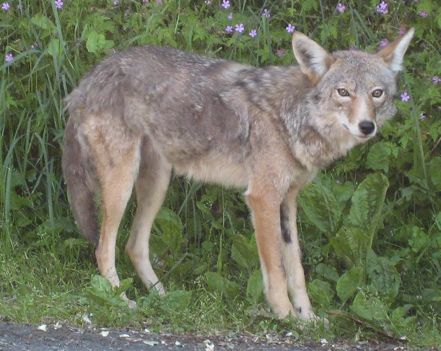
A wild time at Camp Long tonight, as the “Living With Wildlife” presentation offered info about how to do just that – particularly so far as our two biggest wild neighbors are concerned, coyotes and raccoons. Both smart, both requiring specific behavior from all of us so that we can co-exist with as little trouble as possible. Read on for some facts and advice that might surprise you!
 At left, that’s Russell Link, urban wildlife biologist for the state Department of Fish and Wildlife. (He’s written a book on the subject, and much of it is adapted here, for just about any creature you might find.) His major theme: Coyotes are wild creatures and it’s our responsibility to keep them wild. Coyotes are very smart; if a human gives them food or if people leave food out then coyotes will associate people with food. This denies their wild nature, making them dependent on people, and creating problems.
At left, that’s Russell Link, urban wildlife biologist for the state Department of Fish and Wildlife. (He’s written a book on the subject, and much of it is adapted here, for just about any creature you might find.) His major theme: Coyotes are wild creatures and it’s our responsibility to keep them wild. Coyotes are very smart; if a human gives them food or if people leave food out then coyotes will associate people with food. This denies their wild nature, making them dependent on people, and creating problems.
Coyotes are attracted to semi-wooded areas next to open grassy areas, Link noted — human-made areas like golf courses and cemeteries are the two leading urban coyote habitats. Coyotes like to travel in open flat
places, which is why tree clearcutting and human roadbuilding have created ideal paths for them to get around.

(July 2008 photo courtesy Vanessa)
Here’s a good reason to make sure fruit trees in your yard get harvested (if not by you, perhaps by an organization like Community Harvest of West Seattle): Coyotes like fruit that falls from trees. A 1995 study found half the coyote diet was made up of fruit – apples being a favorite. So fruit trees in your yard that aren’t picked may well be coyote bait.
Important note to correct a common misconception: Coyotes see dogs and cats not so much as food, but as competitors for food, and that’s why they may attack them. So keep cats indoors and keep dogs leashed. Link said domestic pets are most at risk in the early spring, when coyote pups are born.
One reason to be happy about sharing neighborhoods with coyotes: They do like to eat rats and mice (another reason why they see cats as competition). They’re also the only predators that naturally help keep down the Canada goose population.
Now, in case you haven’t heard this one before: If you are approached by a coyote, don’t run – Link said, “Be big, be mean, and be loud” — try to make yourself look bigger, act ferocious, and be loud about it. (This isn’t so much because you’re in danger, as it is to make sure the coyote stays afraid/wary of humans, so they can stay wild.)

(July 2008 photo courtesy Susan in Gatewood)
Now, on to Link’s advice about raccoons: Again – don’t feed them either – don’t leave pet food outdoors; try to keep your trash can lids on as tight as possible. Raccoons are most dangerous when they think you’re going to challenge them for their food. They don’t often kill domestic pets but they’ll rough up pets over the food issue.
Raccoons like to climb which is why you find them in trees, on roofs, or in attics.
One last item, to answer a fair number of questions: Coyotes, raccoons, opossums, squirrels, and rats in our state do NOT have rabies. Raccoons can carry distemper, though. So just to be on the safe side, Link recommends, make sure your pets have all their shots.
Again, here’s the link to his “Living With Wildlife” series – use the pulldown menus from the top navigation bar to find information on dealing with just about any creature you might encounter.

| 4 COMMENTS